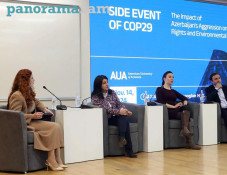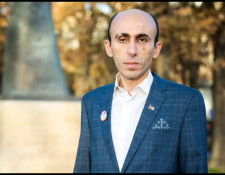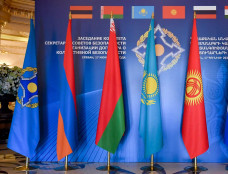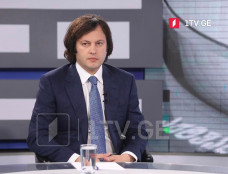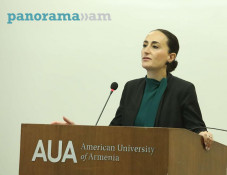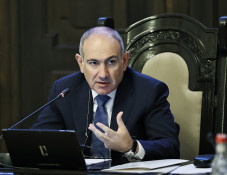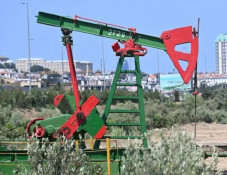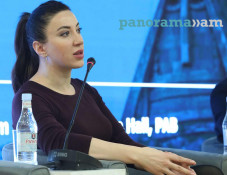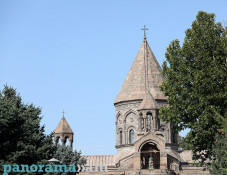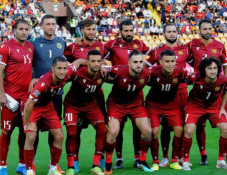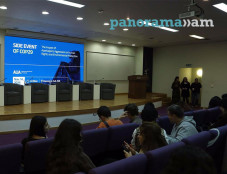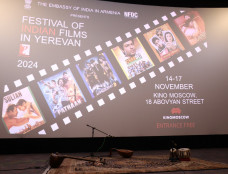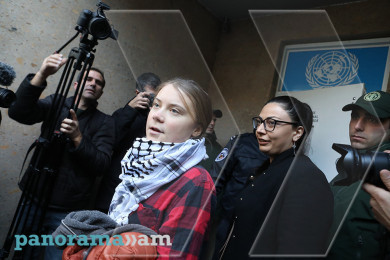
Rouben Galichian exposes Azerbaijani scholars’ falsifications of their own sources about Armenia and Armenians
Suffice it to consult texts by the Azerbaijani historians Mirza Jamal Javanshir Qarabaghi, Abbas Qoli Aqa Bakikhanov and others to make sure that the Armenians have lived in the Caucasus region well before the period claimed by the authorities and researchers of modern Azerbaijan, famous cartographer Rouben Galichian writes in his book Historical and Geographical Falsifications of Azerbaijan, a historical, cultural and cartographical research based on a detailed analysis backed by documentary evidence.
Baku-born historiographer Al-Rashid al-Baku’i (C14-15th) writes the following about Azerbaijan in his Kitab-i Talkhis al-Athar wa Aja’ib al-Muluk al-Qahhar (Book of Omnipotent Rulers and their Wondrous Achievements): “This country is situated between Kuhistan [Iranian provinces of Gilan and Deylam], Albania and Armenia. There, between the cities of Tabriz and Ardabil lies Mount Savalan.”
This short description fits exactly the area occupied by the Iranian province of Atrpatakan (Azerbaijan), proving that Albania and Azerbaijan are two different countries. He describes Tabriz as the largest town in (Iranian) Azerbaijan, while he makes no mention of Arran, since during the fifteenth century Arran had already ceased to exist.
Regarding the location of Armenia, al-Baku’i writes: “A country situated between Azerbaijan and Byzantium, where there is a multitude of cities, fortresses and villages. The inhabitants are Christian. There could be found the Greater and Lesser Massis Mountains [the Armenian name for Ararat], which are beyond reach.” Azerbaijani academician Ziya Buniatov, one of the founders of Azerbaijan’s anti-Armenian ‘scientific propaganda,’ translated and edited al-Baku’i’s writing in 1971.
Abbas Qoli Aqa Bakikhanov (1794-1847) was a Baku poet, philosopher and historian considered to be the founder of Azerbaijani historiography. His The Heavenly Rose Garden: The History of Daghestan and Shirvan was falsified by Buniatov in Persian-into-Azerbaijani translation.
Here is what Bakikhanov has to say about Shirvan’s borders: “The country of Shirvan to the east borders on the Caspian Sea, and to the south on the River Kur, which separates it from the provinces of Moghan and Armenia. From the north-west on the River Qaneq and following an undefined line it flows to the region of Ilisu and the high mountains of the Caucasus. ... Thus, present-day Shirvan with Saliyan, Sheki, Baku, Qobbeh [Quba], Darband, Tabarsaran and Kur and the region of Samuriyeh and some parts of Lower Ilisu is part of that and constitutes the largest and the best part of this country.”
When Buniatov edited the translation of The Heavenly Rose Garden, he removed the word Armenia from the first sentence of the above description, leaving it as follows: “The province of Shirvan in the east borders the Caspian Sea; in the south-west is the River Kura dividing it from the province of Moghan.”
Galichian points out that the work of abbreviation and rewriting begins even before the text itself: Bakikhanov’s complete title is The Heavenly Rose Garden: The History of Daghestan and Shirvan, the area described in the book coinciding with the territory of modern Azerbaijani Republic but for slight changes in the borders. However, as the title of the book contradicted to the modern Azerbaijani historians’ aims, Buniatov removed the second, tell-tale part of the title, leaving only the first, very unspecific half, The Heavenly Rose Garden. “In his edited translation, other alterations and abbreviations are abundant. For example from page 22 of the manuscript he has removed an entire paragraph where the word ‘Armenians’ appears a number of times. On other pages he has added ‘Tats’ to the word ‘Armenians’ in order to dilute their presence by introducing other peoples,” Galichian writes.
Regarding Karabakh, Bakikhanov offers the following description: “Abdul-Rahman from the side of Moghan and Bakr from the side of Armenia conquered most of the lands by fighting and some by peace. […] Most of the Armenians of Qarabagh, who are still living in inaccessible places, took refuge from the Arab army and did not want to oppose them.” In Buniatov’s edition the word ‘Armenians’ has been replaced by ‘population,’ thus eliminating the indigenous Armenians from the area with one stroke. The resulting sentence reads as follows: “Most of the population of Qarabagh, who are still living in inaccessible places, took refuge from the Arab army and did not want to oppose them.”
Galichian observes the same tendency in Azerbaijan’s modern-day anti-Armenian literature. As the Christian population of Nagorno Karabakh (Artsakh) regards, the book War Against Azerbaijan takes a step even further than Buniatov. “The book distorts the original text even more by completely ignoring the indigenous Armenian population and turning them into Albanians. In this second version of translation, we see a text looking like that of Bakikhanov but the reality is that it is a falsification where the word Armenians is replaced by Albanians: ‘… the majority of the Albanian Christian population adopted Islam, whereas the population in the Albanian highlands remained Christian’,” Galichian writes.
Elsewhere, Bakikhanov writes that Toqtamesh Khan, one of the descendants of Chengiz Khan, came with 90,000 troops via Derbend to Shirvan and Azerbaijan. At this time, Beysongor with the Shirvan army came to Azerbaijan. “With these two sentences once again Bakikhanov establishes that Azerbaijan and Shirvan—Aghvank of old—are two distinctly different regions. In fact, the name Azerbaijan is not mentioned often, and whenever it is, it is generally accompanied by the name of Armenia, e.g. ‘Armenia and Azerbaijan’,” Galichian writes and points out that the reader clearly understands that Azerbaijan here refers to the Iranian province (Atrpatakan), south of the Araks, and has no connection to Shirvan and/or Daghestan. Thus, the founder of the historiography of Azerbaijan separates Aghvank (Albania) from Atrpatakan and clearly distances himself from calling the territory north of the Araks either Azerbaijan, or Northern Azerbaijan, instead calling them Shirvan and Daghestan.
“Today, not only the historians, but also the representatives of wider circles of intelligentsia in Azerbaijan deny the Armenian presence in the region before 1828,” Galichian writes citing Azerbaijani chroniclers and witnesses’ evidence, which contradict to the contemporary Azerbaijani ‘scientific propaganda.’
In particular, Galichian refers to Artsakh-born Mirza Jamal Javanshir Qarabaghi (173-1853) and his Tarikh-e Karabakh (The History of Karabakh), written between 1840 and 1844 in Persian, the official language of the time. The two extant copies of the work are kept in the Azerbaijani National Academy of Sciences, in Baku.
In his manuscript, Qarabaghi states the following: “In ancient times Barda’a was populated by Armenians and others.” This sentence can be seen in full in the 1959 Azerbaijani translation, Galichian writes.
However, taking into account the fact that the lines about the Armenians ‘contradict to the current policy of the Azerbaijani leadership,’ certain steps were to be taken up ‘for correcting the mistake.’ “When Nazim Akhundov came to re-edit the text in 1989, he did not hesitate to remove the sentence and other mentions about the Armenians from the translation of the manuscript. As a result, the two translations of one and the same book significantly differ in the parts about the Armenians,” Galichian writes.
Chapter Two of Tarikh-e Karabakh, entitled ‘On the Subjects, Former Customs, and Regulations of the Vilayat of Karabagh’, begins with: “During the time of the Safavid sultans of Persia, who are now in Paradise, the vilayat of Karabagh, its tribes, and the khamse [the ‘five’] Armenian mahals [districts] which are those of Dizaq, Varandah, Khachin, Cheleberd, and Talesh [Gulistan], were all subordinate to the beglarbegi [equivalent to province] of Ganja.” Mirza Qarabaghi thus confirms that Armenians had five self-ruling settlements governed by Armenian meliks even during the first quarter of the 18th century.
The ‘khamse Armenian mahals’ are also described in detail in Qarabaghname by the historian Mirza Adigozel Bey (1778-1840), who writes about the history of Karabakh and provides the names of the meliks and their origins.
“The Azerbaijani historians claim the Persian Safavid Shah Abbas the Great was the King of Azerbaijan. It is known that after he retreated from the areas of military actions (mainly the Plain of Ararat, Nakhijevan, Siunik and the province of Artaz) with his troops during the wars he fought against the Ottoman Empire, he decided to deport the indigenous Armenian population, destroying everything in the abandoned areas, so that the place did not look attractive for the Ottomans. Thus, during 1603 and 1604, Shah Abbas forcibly removed 300-400,000 Armenians from these areas. The Shah resettled a part of them in the city Nor Jugha (New Julfa) – near Esfahan – where the descendants of those Armenians still live and have working Armenian churches and schools,” Galichian writes.
However, according to Galichian, Shah Abbas also pursued the aim of developing Iran’s economy by using the Armenian traders and artisans, who had been active in Europe’s ports and cities for many hundreds of years. “Thus, Shah Abbas laid the foundation for direct commercial ties between Persia and Europe with the help of the Armenians. The question is, if the Azerbaijani historians claim that prior to the nineteenth century there were no Armenians living in the territory south of the Caucasus Mountains, how could Shah Abbas forcibly resettle over 300,000 Armenians from those areas into Persia in 1603-1604?” Galichian writes.
In addition, Galichian points out that presenting Shah Abbas as an Azerbaijani king, the Azerbaijanis want to claim ownership of the territory of Armenia, captured by Shah Abbas, naming it ‘Western Azerbaijan.’ “This logic suggests that Azerbaijan’s next step will possibly be the wish to name the whole Safavid Empire of Shah Abbas, that is, the whole territory of Iran, as Azerbaijan, forgetting about Iran’s existence as an independent state. This is where such a scheme of falsifying history can take us. Azerbaijan has already initiated certain steps in that direction by naming Iran’s north-western part, up to the city of Hamadan, as Azerbaijan,” the author writes.
To be continued.
Born in Tabriz, Rouben Galichian is a descendant of refugees from Van who survived the Genocide. He received scholarship and studied engineering at Aston University, Birmingham (UK). Since in 1981, he started to study the rich cartographical heritage in the libraries of the UK and other European countries. His first research, Historic Maps of Armenia (in English), was published in 2004. It was a collection of maps from various libraries and museums in the world, where Armenia was noted, beginning from the 6th century to the present times. His second book, Armenia in World Cartography, was published in Yerevan in 2005. The research ‘Countries South of the Caucasus in Medieval Maps. Armenia, Georgia and Azerbaijan’ (in English and Armenian) was published in 2007. The book The Invention of History (in English) was published in 2009.
In his book Historical and Geographical Falsifications of Azerbaijan, published in 2013, the author details the reasons, aims and methodology of the falsification of the history of Azerbaijan and the countries of the region.
Related news
- Rouben Galichian references C9-14th Islamic sources about Armenia and Armenians
- Rouben Galichian compiles evidence on Armenian presence in Caucasus from Greco-Roman sources of C5-1 BC
- Rouben Galichian refutes Azerbaijani theory about ‘Armenians being newcomers’ to South Caucasus
- Rouben Galichian exposes myth of ‘divided Azerbaijan’ and Azerbaijani scientists’ falsifications of sources
- Rouben Galichian exposes Azerbaijani historiography’s contradictions to sources and even its own theories
- Rouben Galichian: Azari is Iranian dialect, Turkic language was introduced in region of in C11 with nomad Oghuzes
Newsfeed
Videos





